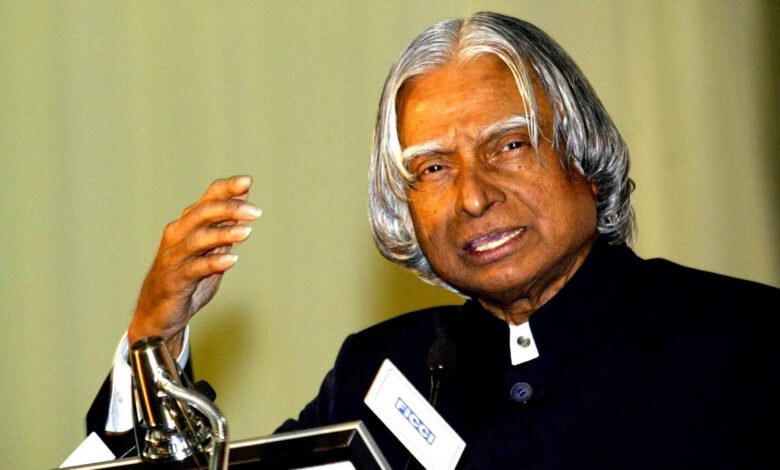
Dr. Avul Pakir Jainulabdeen Abdul Kalam, often referred to as the “Missile Man of India” and “People’s President,” was an extraordinary individual whose life journey serves as a beacon of inspiration for people not only in India but across the globe. His story is one of remarkable brilliance, unwavering dedication, and an unyielding commitment to the betterment of society.
Early Life of Dr. APJ Abdul Kalam:
Born on October 15, 1931, in Rameswaram, a small coastal town in Tamil Nadu, Dr. Kalam’s early life was marked by humble beginnings. He hailed from a modest family and grew up in an environment where financial resources were limited. To support his family, young Kalam even sold newspapers during his formative years.
However, his upbringing in a family that deeply valued education and his parents’ strong moral foundation set the stage for a life of purpose and significance. His father, Jainulabdeen, was an imam at a local mosque, and his mother, Ashiamma, was a housewife. Their unwavering belief in the power of knowledge and their dedication to instilling moral values in their children played a crucial role in shaping Dr. Kalam’s character and vision
Journey in Science and Why is Abdul Kalam so famous?
Dr. APJ Abdul Kalam’s journey in the world of science was nothing short of remarkable. It was marked by his tireless pursuit of knowledge, his contributions to India’s space and defense programs, and his unwavering commitment to the betterment of the nation. Let’s delve into the detailed journey of Dr. Kalam in the field of science.
- Early Education and Inspirations: Dr. Kalam’s early education in Rameswaram was unremarkable in terms of resources and facilities, but it was marked by his extraordinary dedication. He was greatly inspired by his teachers and mentors who recognized his talent and encouraged him to pursue further studies in the field of science.
- Aeronautical Engineering: Dr. Kalam went on to pursue a degree in aeronautical engineering from the Madras Institute of Technology (MIT). His choice of field was driven by a fascination with flight and a deep-seated desire to understand the mysteries of the skies. His time at MIT was pivotal in honing his technical skills.
- Entry into ISRO: Dr. Kalam’s journey in science took a significant turn when he joined ISRO (Indian Space Research Organisation). At ISRO, he was involved in pioneering projects like the Rohini satellite. His work was instrumental in shaping India’s capabilities in space technology.
- Leadership at DRDO: Dr. Kalam’s most prominent contributions to science came during his tenure at the DRDO (Defense Research and Development Organization). He led several critical projects, including the development of the country’s first indigenous ballistic missile, Prithvi. His dedication and leadership played a pivotal role in India’s defense capabilities.
- The Agni Missile: Dr. Kalam’s work on the Agni missile project was groundbreaking. He played a central role in the successful development and testing of the Agni missile series, which is a testament to India’s indigenous missile technology. His work on the Agni project solidified his reputation as the “Missile Man.”
- Pokhran-II Nuclear Tests: Dr. Kalam’s leadership during the Pokhran-II nuclear tests in 1998 was another defining moment in his scientific journey. These tests showcased India’s nuclear capabilities to the world and established the nation as a nuclear power.
- Scientific Temper and Education: Dr. Kalam was a passionate advocate for scientific temper and education. Throughout his career, he stressed the importance of inculcating a spirit of inquiry, innovation, and scientific thinking in India’s youth. He believed that science and technology were the keys to India’s progress.
- People’s President: In an unexpected turn of events, Dr. Kalam was elected as the President of India in 2002. His presidency was marked by a unique blend of scientific thinking and public service. He reached out to children and young adults, encouraging them to pursue careers in science and innovation.
- Inspirational Teacher: Even in his later years, Dr. Kalam continued to inspire students and aspiring scientists through his lectures and interactions. He believed in the power of education and remained committed to mentoring the future generation.
- Literary Contributions: In addition to his scientific achievements, Dr. Kalam made significant contributions to the literary world. His autobiography, “Wings of Fire,” offered readers a glimpse into his life, his vision for India, and his unyielding commitment to excellence
Dr. Kalam’s most significant achievements came in the realm of missile technology. He played a pivotal role in developing India’s first indigenous satellite launch vehicle, SLV-III, and the development of ballistic missile technology. His leadership in the Pokhran-II nuclear tests showcased India’s technological prowess to the world.
Presidency:
In 2002, Dr. Kalam was elected as the President of India, serving from 2002 to 2007. During his tenure, he transformed the presidency into an accessible and inspirational institution, reaching out to children and youth, encouraging scientific temper, and fostering a spirit of innovation.
Legacy and Inspiration:
Dr. Kalam’s legacy extends far beyond his scientific achievements and presidency. He was a gifted teacher who remained committed to education and the future of India’s youth. His inspirational speeches and writings continue to motivate students and aspiring scientists across the globe.
Wings of Fire:
His autobiography, “Wings of Fire,” is a compelling narrative of his life, filled with anecdotes, experiences, and his vision for a developed India. This book has inspired countless individuals to dream big and work hard to achieve their aspirations.
Awards and Achievements of Dr APJ Abdul Kalam:
Dr. APJ Abdul Kalam received numerous awards and honors throughout his life in recognition of his exceptional contributions to science, education, and the betterment of society. Here are some of the most prominent awards and honors bestowed upon him:
- Bharat Ratna (1997): Dr. Kalam was awarded India’s highest civilian honor, the Bharat Ratna, in 1997 for his outstanding contributions to science and technology, particularly in the field of missile technology.
- Padma Bhushan (1981): Dr. Kalam received the Padma Bhushan, the third-highest civilian award in India, in 1981 for his contributions to India’s space and scientific endeavors.
- Padma Vibhushan (1990): In 1990, he was honored with the Padma Vibhushan, the second-highest civilian award in India, for his continued contributions to the country’s defense and space programs.
- Indira Gandhi Award for National Integration (1997): Dr. Kalam received this award for promoting national integration, understanding, and communal harmony.
- Von Braun Award (2013): He was awarded the Von Braun Award by the National Space Society (USA) for his excellence in the management and leadership of the development and operational phase of India’s civilian space program.
- International von Kármán Wings Award (2009): This award, presented by the California Institute of Technology (Caltech) in the United States, recognized his notable contributions to the field of aeronautics and aerospace.
- Honorary Doctorates: Dr. Kalam received numerous honorary doctorates from universities and institutions around the world in recognition of his scientific and humanitarian contributions.
- Doctor of Science (DSc) by Anna University (2007): Anna University, Chennai, conferred upon him an honorary Doctor of Science degree in recognition of his scientific and technological accomplishments.
- King Charles II Medal by the Royal Society (2007): Dr. Kalam was honored with this prestigious medal by the Royal Society of London for his extraordinary contributions to the application of science and technology for the betterment of humanity.
- Hoover Medal (2008): The Hoover Medal, given by the American Society of Mechanical Engineers, recognized his exceptional contributions to public service, leadership, and the promotion of international cooperation.
- Ramanujan Award (2000): This award, instituted by the Alwars Research Centre, recognized his role in the development of aeronautical science in India.
- Inspirational Icon of the Year (2017): Posthumously, Dr. Kalam was honored with the Inspirational Icon of the Year award at the Bollywood & TV Contest in Mumbai.
Passing:
Dr. APJ Abdul Kalam passed away on July 27, 2015, while doing what he loved most—addressing students. He suffered a cardiac arrest during a lecture at the Indian Institute of Management Shillong.
In Memoriam:
Dr. Kalam’s passing was a profound loss, but his memory lives on in the hearts and minds of millions. He continues to be an icon of wisdom, simplicity, and commitment to the progress of India. His life story is a testament to the potential of an individual to make a lasting impact on a nation and the world through vision, dedication, and humility.
Dr. APJ Abdul Kalam’s life was an embodiment of the values he held dear: hard work, a love for learning, and the spirit of service. His legacy remains an inspiration for generations to come, and he will forever be remembered as a true visionary and a beloved leader.



